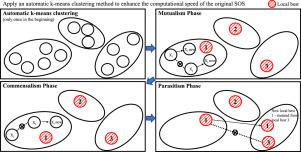Applied Soft Computing ( IF 7.2 ) Pub Date : 2020-09-21 , DOI: 10.1016/j.asoc.2020.106722 Chao-Lung Yang , Hendri Sutrisno

|
This paper proposed a fast metaheuristic method for high-dimensional optimizations problem with only one-control parameter in the setting. Essentially, the innovation of the proposed method is to apply automatic k-means clustering on the initial solutions of symbiotic organisms search to create subpopulations. Only the selected elite solutions in each cluster to interact with one another across clusters in the proposed model. This new elite solution searching process can be considered as a combination of local and global searching based on the solution clusters. The proposed method was compared to six representative methods in 28 benchmark problems and 10 composition problems. Also, the proposed method was also compared with four clustering-based metaheuristic methods. The experimental results show that the proposed model is more efficient in its computation and has a better searching quality. For high-dimensional problems, the performances of the proposed method was compared with the original symbiotic organisms search up to 1000 dimensions. The results show that the proposed method can alleviate the dimensionality effect to produce better solution quality with relatively fast computation.
中文翻译:

高维优化问题的基于聚类的共生生物搜索算法
提出了一种在设置中只有一个控制参数的高维优化问题的快速元启发式方法。本质上,所提出方法的创新之处在于应用自动k-是指在共生生物的初始解决方案上进行聚类搜索以创建亚种群。在建议的模型中,只有每个集群中选定的精英解决方案才能在集群之间相互交互。可以将这种新的精英解决方案搜索过程视为基于解决方案集群的本地搜索和全局搜索的组合。在28个基准问题和10个成分问题中,将所提出的方法与6种代表性方法进行了比较。此外,还将所提出的方法与四种基于聚类的元启发式方法进行了比较。实验结果表明,该模型计算效率更高,搜索质量更高。对于高维问题,将所提出方法的性能与搜索多达1000维的原始共生生物进行了比较。











































 京公网安备 11010802027423号
京公网安备 11010802027423号